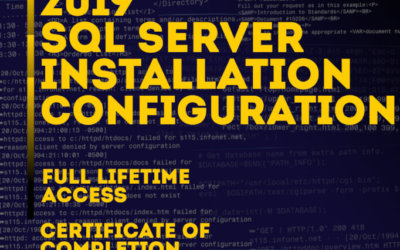
Overview
Course Description:
Title: SQL Server Performance Tuning Masterclass
Description:
SQL Server Performance Tuning Masterclass is an intensive course designed to equip database professionals with the skills and knowledge necessary to optimize the performance of SQL Server databases. Throughout the course, students will delve into the intricacies of SQL Server architecture, learn how to identify and diagnose performance issues and implement optimization strategies to enhance database efficiency and responsiveness.
The curriculum begins with an introduction to performance tuning and an overview of SQL Server architecture. This foundational knowledge will set the stage for understanding the various components affecting performance. Students will then learn about the critical role of indexing in database performance, including creating and managing clustered and non-clustered indexes.
Query optimization is a central focus of the course, and students will learn how to analyze query execution plans and employ various optimization techniques. Monitoring tools like SQL Server Profiler, Dynamic Management Views, and Performance Counters are explored in-depth to enable students to monitor and analyze database performance effectively.
Memory and processor resource management will be addressed, teaching students how to optimize these critical resources for SQL Server. The course also covers storage and I/O performance, focusing on the data file and log file management and strategies for tuning TempDB.
Concurrency issues such as locking and blocking are covered, providing students with strategies to minimize contention and improve transaction throughput. The course also introduces In-Memory OLTP, a powerful feature for optimizing memory-intensive workloads.
High availability and disaster recovery strategies are discussed to ensure students understand how to maintain performance during unexpected events. Additionally, the course covers automation and scheduling of maintenance tasks to keep SQL Server running smoothly.
Students will also benefit from real-world case studies and scenarios that provide practical insights into the challenges and solutions of performance tuning.
Towards the end of the course, students will receive guidance on best practices for performance tuning and troubleshooting common performance problems.
This masterclass suits database administrators, developers, and IT professionals looking to enhance their SQL Server performance tuning expertise. This course’s practical, hands-on approach ensures that students are well-prepared to apply the concepts and techniques in real-world environments.
Prerequisites: Familiarity with SQL Server administration and basic database concepts is recommended.
Duration: Varies (typically 4-6 weeks)
Mode: Online or In-Person
Certification: Certificate of Completion upon passing the final assessment.
The curriculum for SQL Server Performance Tuning generally covers a wide range of topics to provide students with the necessary skills to optimize the performance of SQL Server databases. Here’s a list of topics that are typically included in such a curriculum:
1. Introduction to SQL Server Performance Tuning
2. Understanding Database Architecture
3. SQL Server Indexing
a. Clustered and Non-clustered Indexes
b. Filtered Indexes
c. Index Maintenance
4. Query Optimization Techniques
a. Reading Execution Plans
b. Query Hints
c. Optimization for Ad Hoc Workloads
5. SQL Server Profiler and Trace Analysis
6. Statistics and Cardinality Estimation
7. Database Engine Tuning Advisor
8. Performance Monitoring Tools and Techniques
a. Dynamic Management Views and Functions
b. Performance Counters
c. Extended Events
9. Managing Memory and Processor Resources
10. SQL Server Storage and I/O Performance
a. Data File and Log File Management
b. TempDB Performance Tuning
11. Locking, Blocking, and Concurrency
12. In-Memory OLTP
13. High Availability and Disaster Recovery Strategies
14. Automating and Scheduling Maintenance Tasks
15. Best Practices for SQL Server Performance Tuning
16. Troubleshooting Common Performance Problems
17. Case Studies and Real-World Scenarios
18. Performance Tuning for SQL Server in Azure
Note that the specific topics and their order may vary depending on the course or training program. Additionally, new methods and tools for performance tuning are continuously emerging, so it’s important to stay current with industry trends and best practices.
Course Features
- Lectures 20
- Quizzes 0
- Duration 50 hours
- Skill level All levels
- Language English
- Students 23
- Certificate No
- Assessments Yes





